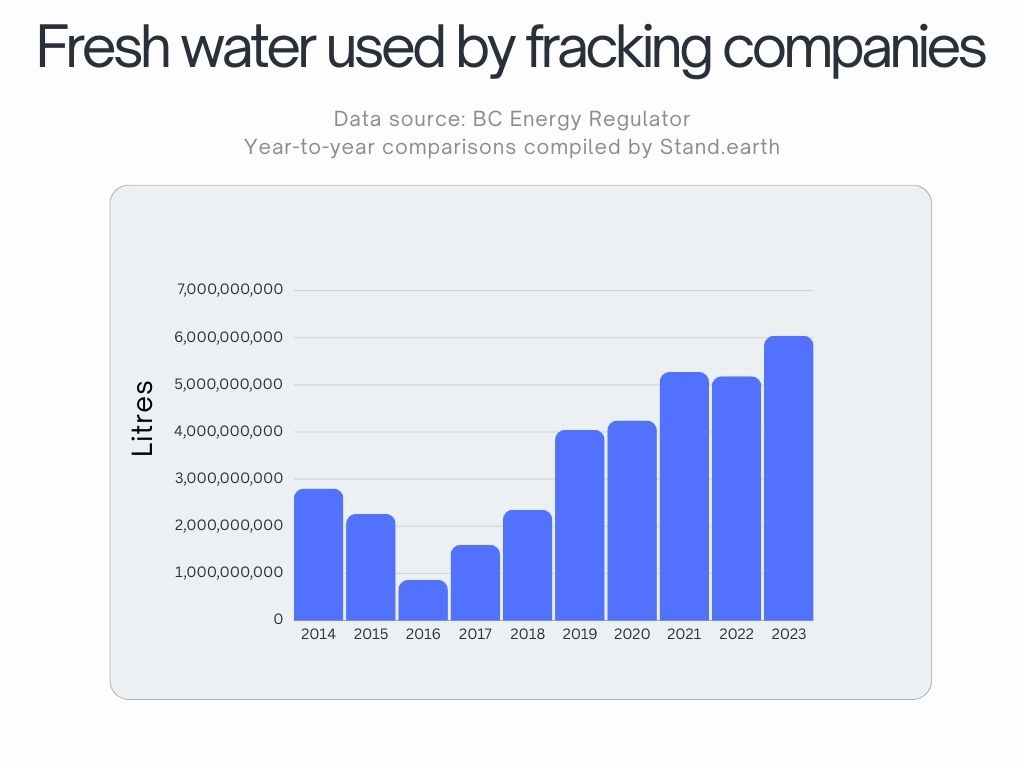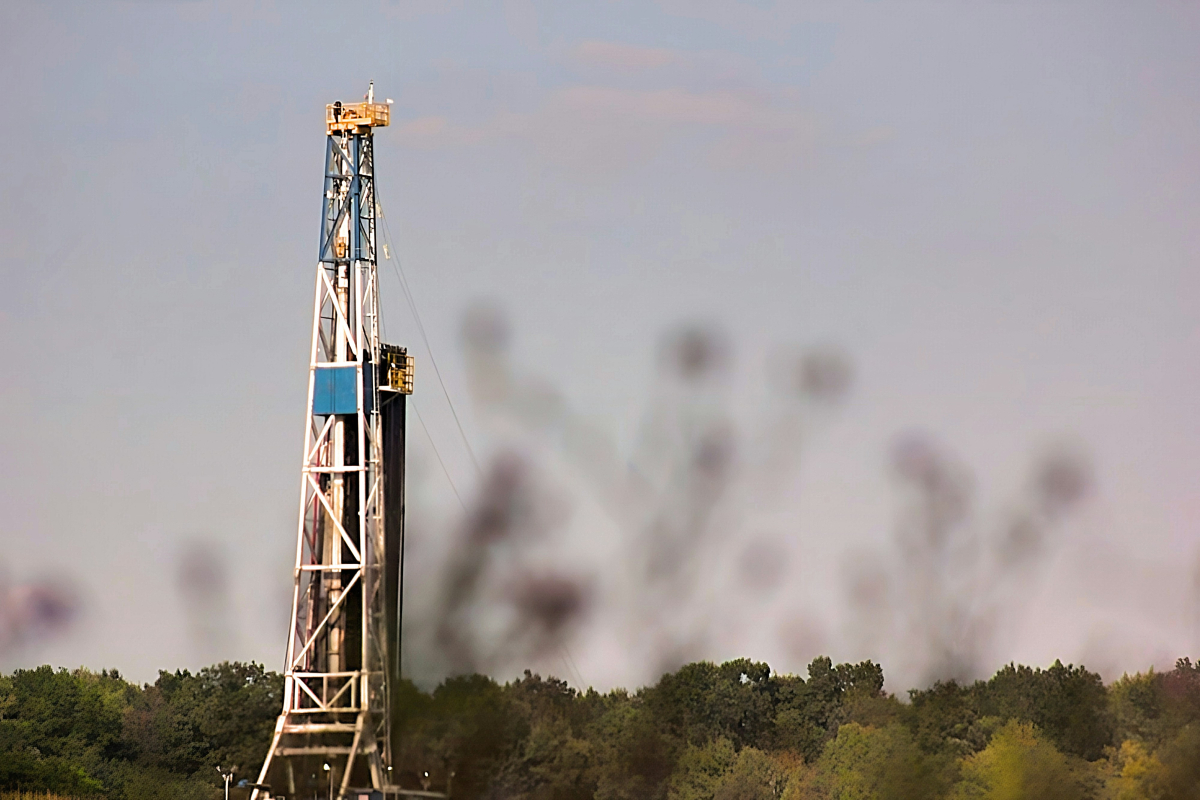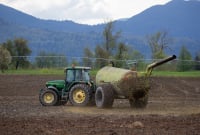Oil and gas companies in British Columbia used record amounts of fresh water for their operations in 2023, according to new data published by the BC Energy Regulator.
Companies used 16 per cent more water from rivers and lakes than in 2022 for a total of over six billion litres, despite the Peace and Fort Nelson districts currently experiencing a multi-year drought, said Stand.earth's canadian oil and gas program director Sven Biggs in an interview with Canada’s National Observer.
“The companies pay $2.25 per million litres of water which means that the whole oil and gas sector paid somewhere in the region of $13,000 to access fresh water in 2023,” said Biggs.
Almost all the water licences are in northeastern B.C., where oil and gas production is located.
Other industrial water users in the province — like farmers and pulp mills, for example — bear the cost of treating the water they use so it can be returned to the water cycle, but the water used by oil and gas is so toxic it has to be stored in wells below the water table to avoid contamination, Biggs added.
“So they're paying water rent, but they're basically destroying what they're renting and taking it out of the water cycle forever,” said Biggs.

A June 25 report commissioned by the David Suzuki Foundation predicts water use will skyrocket in coming years as fracking increases in the Montney gas field in B.C. and Alberta.
Stand.earth put out a report on fracking companies’ freshwater use in December 2022. Since then, the drought in the Peace and Fort Nelson districts has gotten much worse.
“The impacts are super obvious if you've either been to the region or just seen the news about the wildfires and the struggle with farmers and BC Hydro with water access for water this year and last year,” said Biggs.
A June 25 report commissioned by the David Suzuki Foundation puts the total water use even higher at about 9.7 billion litres in B.C. Biggs said this discrepancy is because Stand.earth only looked at fresh water from rivers and lakes — other sources of water (deep wells and privately owned man-made runoff ponds) are not disclosed by the BC Energy Regulator because they don’t require a licence. To reach an estimate for total water including these sources, the David Suzuki Foundation did analysis based on how much water is used in drilling operations, as well.
“We think roughly a third of the water used by industry comes from these unregulated sources,” said Biggs.
That total — 9.7 billion litres of water — is more than enough to fill every public swimming pool in Canada.
A Leger poll, commissioned by a coalition of environmental groups including Stand.earth, asked respondents if the government should regulate and reduce the amount of fresh water used by oil and gas companies. Sixty-nine per cent of respondents strongly or somewhat agreed. The online poll ran from May 30 to June 10 and surveyed 1,000 Canadians on issues like forestry, fracking and energy efficiency. More than half the people surveyed were from the Lower Mainland, Sea-to-Sky and Fraser Valley regions.
B.C. is poised to expand its LNG industry with six projects in various stages of development. Environmentalists warn that a surge in fracking and LNG projects is incompatible with the province meeting its climate targets.
It’s hard to put a price on water, said Biggs, but one of Stand.earth’s recommendations is for the provincial government to charge fracking companies a high enough price to encourage the conservation of fresh water.
“A cent a litre seems like the absolute minimum that the government should be asking for,” he said. The current price is one four-hundredth of that.
Requiring companies to treat wastewater and reuse it in fracking operations would also help reduce the amount of fresh water contaminated by the industry, the report noted.
The federal government’s projections indicate the wildfire risk in Canada is expected to remain high this summer, particularly in regions plagued by “intense drought,” including northeastern B.C. Last summer, a fire in the Peace region burned up an area larger than Prince Edward Island, making it the largest forest fire in B.C.’s history.
Natasha Bulowski / Local Journalism Initiative / Canada’s National Observer






Comments
Shocking that the oil and gas industries are using so much water and being charged chump change. This needs to change.
During a severe drought, Oil and gas companies are using billions of liters of water; but they are paying only 13 000 $ !!!!
Water is essential for human and animal life; gas is not essential. In fact, gas is destroying life with climate changing GHG. The text says that companies should pay one cent per liter; compare that to a 500ml bottle of water that you buy in a vending machine!
The demand destruction for fossil fuels can't come soon enough.
The development of the green economy can't come soon enough.
The replacement of resource extraction & export with value added economic models (manufacturing, knowledge, tech, sustainable urbanism...) powered by zero emission electricity can't come soon enough.
LNG and all its deleterious effects is in some ways similar to the wholesale exploitation of sea otters and beavers during the 18th Century. One day there will be a predictable reconing regarding supply and demand.
But with LNG --and the entire petroleum industry -- you've got mega billions locked up in infrastructure that may well be left to rust as renewables erase petro exports.
FAQ on the Coastal GasLink website: "Will Coastal GasLink be involved in fracking? Coastal GasLink will not be producing the natural gas – our role is to ensure the safe transportation of natural gas once it is produced." Coastal GasLink in turn will deliver methane to the Haisla Nation/Pembina Pipeline Cedar LNG project.